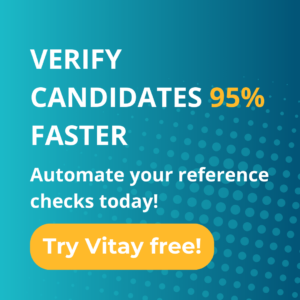So you’ve found the perfect candidate, the interview was flawless, and now you’re gearing up to offer them the job. There are only two things still standing in the way. Before you make the call offering the candidate the new job, they have to pass both a comprehensive background check and multiple personal reference checks.
So what’s the difference between these two hiring necessities, and what part do they both play in offering job? While background checks and reference checks cover similar ground, a reference check involves contacting personal references, while a background check is an identity investigation using public records and reports.
In today’s competitive job market, many businesses implement both a standard background check and a series of background check references (or reference checks) to ensure that they’ve chosen a trustworthy candidate for their open job position. Read on for a detailed breakdown of these two job offer prerequisites.
Table of Contents
- What is a reference check?
- How to prepare for a reference check
- What is a background check?
- How to prepare for a background check
- Background check FAQs
- Background Check vs Reference Check
- 5 reasons to use Vitay for reference checking
- Conclusion

What is a reference check?
During the hiring process, the employer will check each job candidate’s provided references to confirm that their given information has been accurate and forthcoming. Reference checks involve in-depth verification from previous employers, managers, supervisors, and schools to determine that the applicant’s history, education, skill set, and qualifications are as indicated.
By asking past employers and educational institutions targeted questions about an applicant’s prior performance, reference checks help companies to identify the strongest candidates for a job position. Rather than depending solely on the cut-and-dry information a resume provides, a hiring manager gains valuable insight into the personality and work ethic of a job applicant through hearing from previous employers and educators.
This communication also helps them identify potential red flags that might not be present immediately in an employee’s performance. That way, a business can reduce liability and foster a safer and more productive work environment.
How to prepare for a reference check
Employers can best prepare for a reference check by following these guidelines:
- Confirm that you have the applicant’s permission to contact their references.
- Decide which references are likely to have the most relevant information to the position the applicant is being considered for.
- Prepare a list of questions that help assess the applicant’s strengths and weaknesses. Use these questions to evaluate the candidate’s communication skills, work ethic, reliability, efficiency, and capacity to work in a team environment.
- Ask questions that target the specific position the applicant is being considered for to ensure that they’re a good fit for that particular role in the company.
For the applicant, a requested employment reference check is good news, as it’s typically one of the last steps a company takes before making a hiring decision. To make the best impression on this last hurdle, the candidate will benefit from taking these actions:
- Pick references that will best showcase your current skill set and experience.
- Let your references know that they may be contacted soon by the company. Additionally, make sure to provide them with any additional information they might need about your work experience.
- Follow up the process with a written thank you to your references for their efforts. And if you get the job, it never hurts to send a second thank you to let them know the good news!
and save an average of 2 hours per candidate.

What is a background check?
A background check is the part of the employment verification process that provides a business with legal information about an applicant’s previous history. This inquiry includes identity verification and a look into the applicant’s employment history, credit history, driving record, educational history, and criminal history. Some background checks also include drug testing and social media research, but those are less common for standardized background-checking services.
Background screening helps protect businesses from the potential risks and liabilities that can occur when bringing on a new employee. By looking into whether an employee has a history of violence, substance abuse, fraud, or other potentially dangerous behavior, companies safeguard the workplace environment for other employees and prevent the expense and time waste that come from having to fire and replace an employee.
How to Prepare for a Background Check
For Employers:
Employers can best prepare for a background check by following these guidelines:
- Obtain the applicant’s written consent to conduct the background check, ensuring compliance with legal requirements.
- Identify which background checks are relevant to the position (e.g., criminal record, employment verification, education verification).
- Select a reputable background check provider to ensure accurate and reliable information.
- Establish a fair process for handling any negative findings, including giving candidates an opportunity to explain or dispute the results.
For the Applicant:
Being asked to undergo a background check is a positive step toward employment. To make the best impression, consider these actions:
- Ensure all information on your resume and application is accurate to prevent discrepancies during the background check.
- Review your own records by obtaining a personal background check to be aware of what employers might see.
- Prepare necessary documents such as diplomas, certifications, and employment records that may be requested.
- Respond promptly to any inquiries from the employer or background check provider to keep the process moving smoothly.

Background Check FAQs
Does a company need my consent to run a background check?
Yes. Applicants are protected from unauthorized background checks by the Personal Information Protection and Electronic Documents Act (PIPEDA) in Canada and by the Fair Credit Reporting Act (FCRA) in the United States. Both state that employers must get written authorization from an applicant or employee to run a background check.
What does it cost to run a background check?
Pricing for background checks varies based on your location and the kind of background check ordered. On average, the price can run you anywhere between $15 and $75. However, some checks that involve more extensive testing (drug panels included) can cost $100 or more.
How long does a background check take?
It typically takes 2-5 business days for a background check to be completed. However, the process can be delayed if there are any complications with addresses, name verification, or incomplete paperwork.
How far back in your history does a background check go?
In Canada, background checks can look back as little as five years or as far as the number of years since the applicant turned 18. And a criminal offense can last up to 80 years on a background check before it gets struck from a citizen’s record.
In the US, the FCRA has a seven-year rule that prevents “civil suits, civil judgments, arrest records, and paid tax liens” from appearing in a background check after 7 years. However, some states have passed laws allowing background checks to look back a full ten years for criminal convictions, misdemeanors, and bankruptcy.
Does a background check hurt your credit?
Fortunately, no. Because so many companies require a background check during their hiring process, employer credit checks are considered a soft inquiry, which won’t affect your score.
Are drug tests part of a background check?
Generally, the company requesting the background check can decide whether or not to include a drug test as part of their background check. However, in the US, some industries require a drug test with every background check, including all civil service jobs and jobs within the Department of Transportation. In contrast, Canada rarely allows for drug testing as part of the background check process.
What does a 10-panel drug test check for?
A standard 10-panel drug test checks for:
- Marijuana
- Cocaine
- Amphetamines
- Opiates
- Phencyclidine (PCP)
- Benzodiazepines
- Barbiturates
- Methadone
- Propoxyphene
- Methaqualone (Quaaludes)
Does CBD show up on background check drug tests?
While CBD itself won’t show up on a drug test (drug tests don’t specifically look for CBD), CBD use can sometimes lead to a positive result on a drug test if the amount of THC in the product is higher than what’s listed on the label. According to Forbes, it’s not uncommon for this to be the case, as the CBD industry is mostly unregulated, so products may contain more THC than advertised.
Background Check vs Reference Check
The difference between a background check and reference check lies in the type of information collected: background checks verify criminal, commercial, and financial records, whereas reference checks assess the candidate’s suitability and performance to protect against bad hires.
Background Checks focus on verifying an individual’s criminal history, employment records, education, and other public data. They provide a comprehensive view of the candidate’s past, ensuring there are no hidden issues that could pose a risk to your organization.
Reference checks, on the other hand, delve into the candidate’s professional life by contacting former employers, colleagues, or supervisors. The aim is to gather insights into their work ethic, performance, and interpersonal skills. This process helps determine if the candidate will be a good fit for the team and align with company culture.
By combining both background and reference checks, employers can create a more holistic picture of a candidate, balancing factual history with personal testimonials. This dual approach not only helps in identifying the right fit but also mitigates the risk of a poor hire.

5 reasons to choose Vitay for reference checking
Let’s face it. Manual reference checking is an arduous process that steals hours from your schedule for weeks on end. Instead, take the easier route and try Vitay, a cloud-based digital referencing system that automates the complete reference-checking process from start to finish.
Here are five reasons why so many businesses have decided to switch from a manual reference checking system to reference automation with Vitay.
1. Automated reference checking
Vitay makes it easy for companies to avoid playing phone tag in favor of automated communications. Within minutes, you can contact your candidate with multiple reference requests rather than spend weeks juggling schedules to reach people. References can then fill out questionnaires on their own time. Vitay includes automated follow-ups and reminders that can be sent out if needed.
And Vitay’s software is simple and intuitive. Businesses can easily upload and customize their question sets for specific job positions, save them for future reference checks, and organize data on multiple candidates in one secure place. Plus, Vitay includes e-signature services for authorizations, as well as customizable branding for communications with potential employees and their references.
2. Faster background checks
Vitay currently offers automated, cost-effective background checks for Canadian businesses, with additional locations coming soon. Vitay’s background check process is 75% faster than a manual check, and the results have higher levels of accuracy and are fully auditable. Plus, Vitay background checks can be completed outside business hours, averaging a turnaround time of 24-36 hours.
Vitay’s background checks include national criminal record checks, criminal record checks (self-declaration), employment verification (options include 3-year, 5-year, 7-year, and entirety), diploma/accreditation/professional association, and international security (anti-terrorist) checks.
3. Versatility
Vitay helps reduce the amount of time it takes to onboard an employee and allows for a more hands-off approach when it comes to checking references. Rather than spending an hour attempting to call a single reference of one candidate, Vitay helps users streamline the reference process to the point where they can spend that same amount of time sending out 200 reference checks.
Plus, along with reference and background checks, Vitay’s website offers both pre-screening tests and post-employment interviews. These services help companies reflect, grow, and gain hiring insights, which lead to lower turnover rates and a decrease in onboarding costs.
4. Outstanding customer service
Our clients agree: Vitay offers standout customer service. In fact, Vitay is one of the only reference-checking companies to offer a live customer support chat. Plus, Vitay is known for its attentiveness to requested features and regularly makes updates to implement customer requests.
5. Affordability
No matter the size of your business, Vitay offers manageable solutions for every company, from small organizations to large corporations. With prices starting at a pay-as-you-go $15 per candidate, Vitay provides one of the most affordable automated reference check services on the market today.
Conclusion
Proper employee screening is an essential part of the interview process. Without pre-employment background and reference checking, companies risk hiring non-qualified candidates and losing thousands of dollars worth of time and effort. Fortunately, Vitay makes it easy to automate the hiring process, so your business can find and hire ideal job candidates in record time. And all the hours saved not hunting down references? You can spend them focusing on recruiting, sales, and managing your business.
Want to learn more about how to save your business an average of 2 hours of productivity time per reference? Sign up for a free demo to learn how Vitay revolutionizes the reference checking process for your business.




Comments are closed.